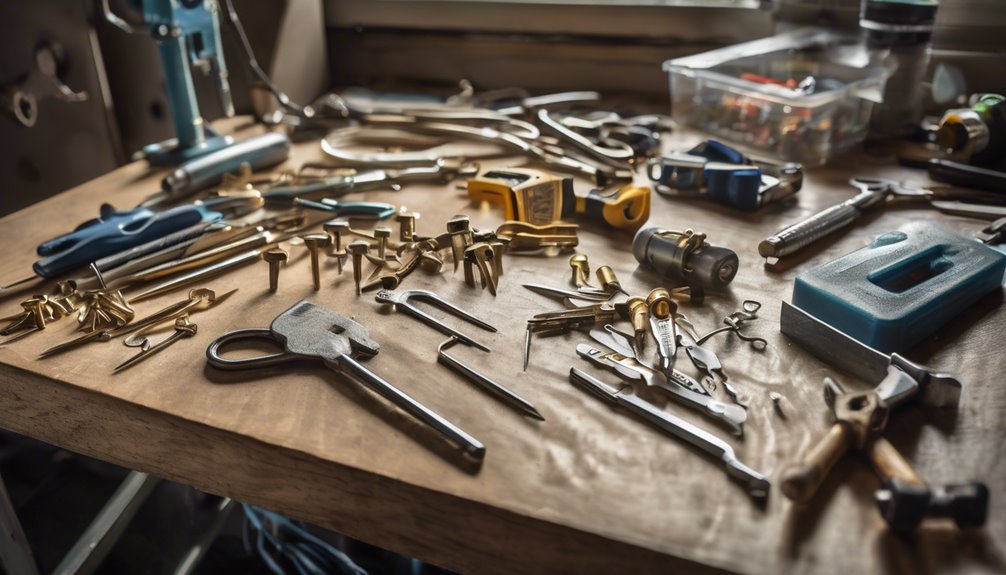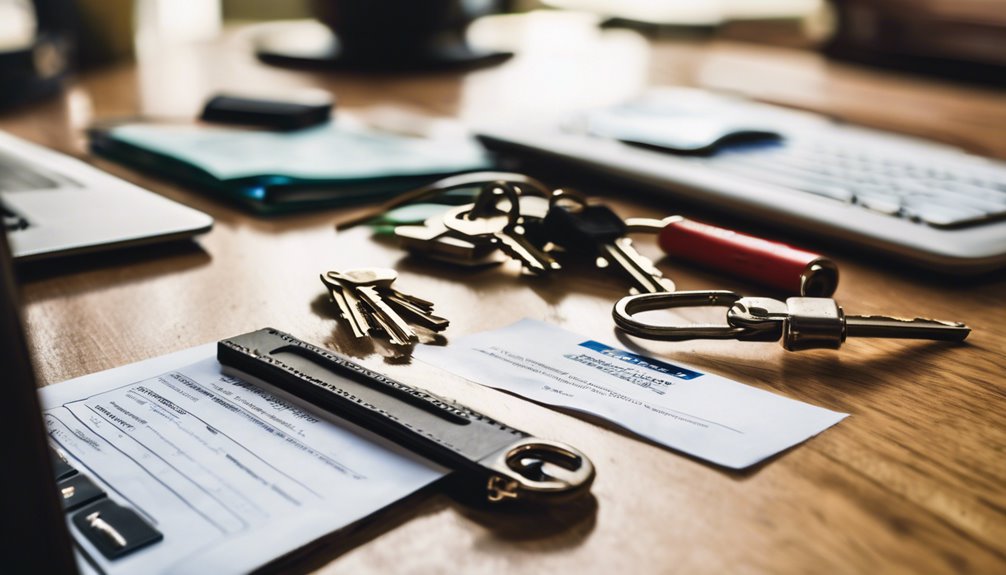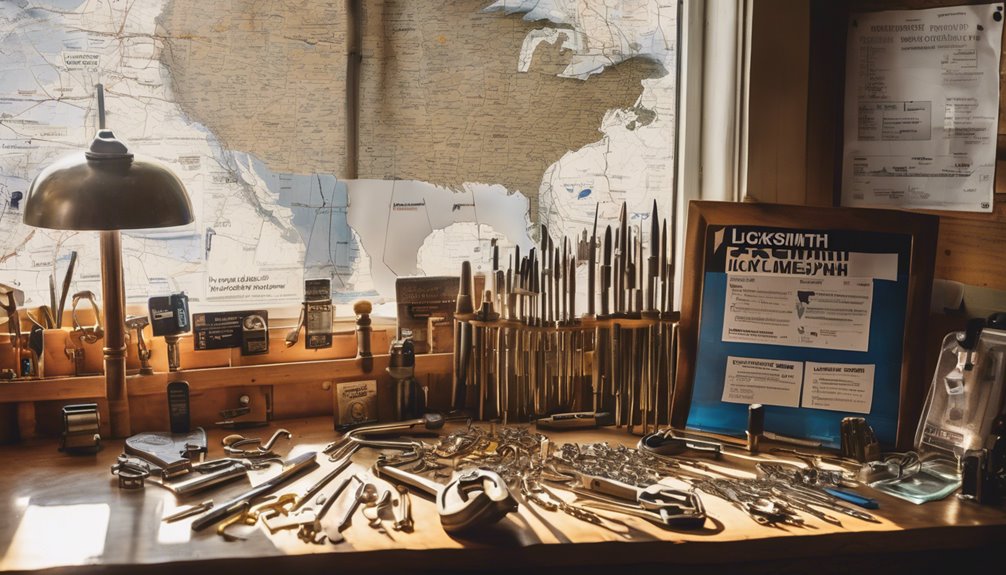If you’re considering becoming a locksmith in Maryland, there’s a clear path you need to follow. First, you’ll need to meet specific age and legal requirements. Then, there are essential steps like completing training and securing a business address. It’s important to understand the application process and what it entails. You might be surprised at some of the details that can make or break your journey in this field.
Key Takeaways
- Complete the application form and submit a non-refundable fee of $225 for the Maryland Locksmith Licensing Program.
- Undergo a criminal background check, including fingerprinting, to ensure eligibility.
- Obtain general liability insurance with coverage of at least $300,000 for your business.
- Provide proof of a fixed business address; motor vehicles are not accepted.
- Consider attending accredited locksmithing schools and engaging in apprenticeships for essential training.
Requirements for Becoming a Locksmith in Maryland

To become a locksmith in Maryland, you need to meet several specific requirements.
First, you must be at least 18 years old and provide proof of a fixed business address; motor vehicles aren’t accepted. You’ll need to undergo a criminal background check, which includes fingerprinting, as felony convictions related to locksmithing can disqualify you.
To become a locksmith in Maryland, you must be 18, have a fixed business address, and pass a criminal background check.
Additionally, your locksmith business must carry a general liability insurance policy of at least $300,000.
While no formal exam is required, engaging in locksmith training through accredited schools, online courses, or apprenticeships with licensed locksmiths can be beneficial.
When you’re ready, submit a non-refundable application fee of $225 to obtain your locksmith license, along with all necessary documents and passport-size photographs.
Understanding the Role of a Locksmith in Maryland
We’re now diving into the role of a locksmith in Maryland, giving special attention to the skills and responsibilities involved in this profession. For starters, the skills required for locksmithing in Maryland are extensive. They include proficiency in installing, repairing, and operating a variety of locking devices. Additionally, a keen understanding of electrical and mechanical lock systems is crucial. The demand for locksmith services in Maryland is high, with locksmiths often called upon to handle everything from lockouts to installing high-security systems. This demand requires locksmiths to stay updated on the latest security technologies and techniques. It’s a profession for those who value independence and problem-solving, offering the freedom to work hands-on and provide essential services to the community.
Educational Pathways for Aspiring Locksmiths
Several educational pathways exist for aspiring locksmiths in Maryland, each offering unique benefits.
You can choose from:
- Locksmithing Schools: Attend accredited programs that teach essential locksmith skills, including lock mechanics and key making, often in two semesters.
- Apprenticeship: Work under a licensed locksmith to gain hands-on experience and practical knowledge in lock installation.
- Continuing Education: Stay updated with the locksmith industry through resources from the Associated Locksmiths of America, focusing on advanced training for specialized areas like electronic locks.
The Application Process for a Locksmith License

Applying for a locksmith license in Maryland involves several key steps that you’ll need to follow closely.
First, complete the application form and submit a non-refundable fee of $225 to the Maryland Locksmith Licensing Program.
You’ll also need to provide two sets of fingerprints for a criminal background check through the Maryland Department of Public Safety.
Make sure you have a fixed and verifiable business address, as motor vehicles aren’t acceptable.
Additionally, you must maintain general liability insurance of at least $300,000, including proof with your application.
Finally, verify that all required documents, including photo IDs for licensed locksmiths, are attached to avoid delays in the application process.
Criminal Background Checks and Their Importance
While you may feel confident about your skills as a locksmith, a clean criminal background is essential for obtaining your license in Maryland. The process includes a criminal background check initiated by the Department of Public Safety, which requires fingerprints from authorized locations.
Key points to take into account are:
- Disqualifying factors such as felony convictions can severely affect your license eligibility.
- Providing false information or impersonation will lead to immediate denial.
- The Secretary of State evaluates your criminal history records check to assess the nature and time since any crime.
Without a clean criminal record, your chances of becoming a locksmith in Maryland diminish greatly.
A clean criminal record is crucial for aspiring locksmiths in Maryland to ensure career success.
Prioritize maintaining a spotless background to secure your future in this profession.
Starting Your Locksmith Business in Maryland

Starting a locksmith business in Maryland requires careful planning and adherence to specific regulations. You must be at least 18 years old to apply.
Begin by submitting a completed application and a non-refundable fee of $225 to the Maryland Locksmith Licensing Program. Verify you have a fixed business address, as motor vehicles aren’t accepted. You’ll also need to provide proof of general liability insurance of at least $300,000.
A criminal background check, including fingerprinting, is mandatory for you and your employees. Once you’re licensed in Maryland, maintain compliance by notifying the Maryland Department of Labor of any changes.
Remember to renew your license every two years for a fee of $225 to stay in good standing.
Frequently Asked Questions
Do You Need a License to Be a Locksmith in Maryland?
In Maryland, you don’t need a personal license to work as a locksmith if you’re employed by a licensed business.
However, the business itself must obtain a state license from the Maryland Department of Labor.
If you plan to own a locksmith business, you’ll need to meet specific requirements, including being at least 18, providing proof of a fixed address, and obtaining general liability insurance.
Do Locksmiths Make Good Money?
When it comes to making good money, locksmiths can really cash in!
In Maryland, you could earn an average salary of around $46,350 a year, with entry-level positions starting at about $28.04 per hour.
If you gain experience or specialize in certain skills, your earnings can soar to over $75,000 annually.
Plus, being self-employed lets you set your own rates, giving you even more control over your income.
How Long Does It Take to Learn to Be a Locksmith?
Learning to be a locksmith can take anywhere from a few weeks to several months, depending on the program you choose.
If you opt for a basic course, you might finish in just two months, focusing on essential skills.
More extensive training, which often includes hands-on experience, may last up to three years with an apprenticeship.
Online courses offer flexibility, allowing you to learn at your own pace, impacting how long it takes to complete your training.
Is It Worth Training to Be a Locksmith?
If you’re weighing the pros and cons, training to be a locksmith can be a golden opportunity.
With a solid average salary and the chance to work in a hands-on, diverse field, it’s definitely worth considering.
Plus, accredited programs can get you job-ready in just a couple of months.
You’ll gain valuable skills and credibility, making you more attractive to employers.








